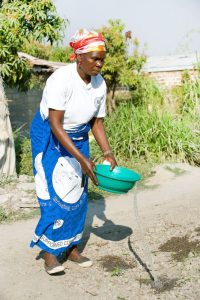Climate Change in Zambia
Creation, AgricultureContributed by: World Renew

Written by Ru Waddell
Last week I visited a small village near the western border between Zambia and Angola. This district is suffering the worst drought in living memory and, as I was driving away, I felt—for the first time in my life—fearful that some of those I left behind might not be there in six weeks if something isn’t done to help them.
Driven by rising sea temperatures, this drought has shattered the fragile food security southern Africa has tried to achieve. More than half of Zambia’s population of 16 million plus citizens—in fact well more than half of the entire global south—are suffering dire deprivation.
The irony of this situation is that the people who are most affected are the least responsible for their plight. The infant failing to thrive because of poor nutrition; the little girl who cannot attend school because her parent’s crop failed again and so her family lacks the money to send her to learn; a family ripped apart as their father heads to the mines looking for work and doesn’t return; the mother who has nothing to sell but her body so she can earn money to buy food for her children. They have not caused their suffering.
They are all impacted by a system that they had no say in and have nothing to do with. We, in our wealthy, industrialized nations, have become rich by a carbon intensive development path. How we live and what we consume affect the vulnerable. Climate change, and our indifference towards it, is violence against them. It is now our responsibility to make major changes.
It is now our responsibility to force emissions cuts and policy change in our own countries to reverse climate change. It is now our responsibility to invest in concerted global efforts to move to a net zero carbon pathway. It is now our responsibility to finance vulnerable countries’ adaption to the devastating impacts of climate change. We bear that responsibility.
Zambia, particularly in the southern and western regions, testifies to the injustice of climate change. Rural, subsistence, and agrarian communities are feeling the full impact of increasing temperatures, poor and erratic rainfall, crop failure, livelihood destruction, and acute hunger. Despite producing little to no emissions, these communities bear the brunt of a climate crisis that forces them to turn to destructive coping mechanisms like unsustainable agriculture practices, mass deforestation for charcoal production, and over-fishing. In just the last ten years, Zambia has lost the bountiful, well-managed fishery of the Zambezi River and forest cover equivalent to the entire country of Ireland.
In light of this, World Renew’s Zambia Country Program and partners’ interventions focus on the mitigation of these effects. We have worked with communities across Zambia to restore lives and livelihoods destroyed by climate change and to build resilience to its effects. These efforts include:
- Developing early warning systems and delivering weather information to at-risk communities.
- Teaching “climate smart” agriculture techniques like minimum tillage, soil cover, crop diversity, agro-forestry and seed sovereignty.
- Strengthening the expansion of farming as a livelihood from subsistence to semi-commercial by providing support in accessing markets and crucial livelihood diversification, such as beekeeping, aquaculture, and small livestock production.
- Distributing over $2m in relief interventions for affected communities to preserve life and restore livelihoods.
- Advancing livestock management and management techniques that support at-risk livestock or replace animals lost as a result of disaster.
While critical for survival now, these interventions will become ineffective within the next decade if there are not radical steps taken in the West to alter the course of global warming and climate change.
The wise Reverend Kanchele of the United Church of Zambia shared his thoughts with me on a visit to his stricken community last week:
“If we lived in a world that was fair and just, these problems would be something we could address ourselves. But, because we haven’t caused these changes in our climate, we alone cannot solve them. We need richer, more polluting countries to change their behaviour and cut their emissions rapidly if we’re going to hold back or even reverse the devastation of climate change and its effects.
This crisis is global in its nature and making, and as such we must see this as an opportunity for the world to act together, in solidarity and fairness. In Zambia we have almost limitless potential for clean energy, but we need the funding and the support to unlock it. We have renewable resources of wind, sun and water with which we can power our entire region’s development, but we don’t have the finances, technology, or expertise to harness them.
If I have one message to our brothers and sisters in the USA and Canada it is this: it is vital that you and your governments heed the warnings of UN scientists and cut your emissions urgently. You hold the lives of millions of the poorest people not only in Zambia but across the world in your hands and this responsibility and these millions demand that you do what is required to remedy the situation.”
